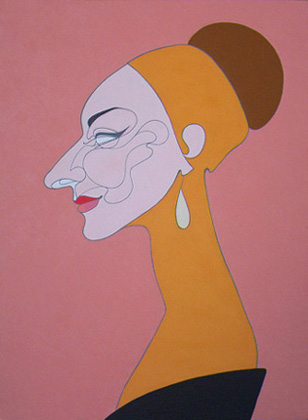O Dio! Vorrei morir!
(Puccini, Gianni Schicchi)
Prima donna?
Seriously. That is so 20th century. Today there are no first ladies of opera (except in the so-called developing countries, such as mine). Either a singer is top class, and opera companies chase her with contracts, or she is not top class and she has to try even harder to make her way through thousands of great performers. But even the most sought-after singers are not divas, nor are considered divine in any way.

If she weren’t a diva, would she look like this?
By Oleg Karuvits (http://www.karuvits.nl/Maria_Callas.htm), via Wikimedia Commons
No matter the anachronism, the terms “prima donna” and “prima donna assoluta” have been historically associated with Maria Callas.
Why do we talk about her right now? Because she died on September 16, 39 years ago. And she definitely deserves to be the subject of many an article anyway.
Because opera is unpleasant, and she sang opera
The first time I heard her voice was when I was 10 or so. I jumped into the middle of an aria that had been playing on the radio. I had no idea who was the singer. Listening to her for only a couple of minutes was quite a distressing experience for me. I didn’t know a thing about opera at the time, but that voice haunted me through the night. And not in a good way, I have to admit.
Our next encounter happened 5 or 6 years later. During that period I was introducing myself to opera. Naturally, I wanted to hear the most famous name. With the very first notes, I realized the voice sounded strangely familiar, and I tried my utmost not to turn it off. That aria was supposed to represent a lovely little song by a girl who begs her father to let her marry, for God’s sake!
What I actually heard was a naughty little monster pretending to be a sweet girl.
Exactly that was the reason why I remembered having heard her before. It was one of those few voices one can never forget (even if they wanted to). Her singing was all but beautiful. That voice could never be a voice of an angel or any other boring virtuous creature. She was a true opera witch. And witches are exciting. All it takes to fall in love with them is a little time and (im)patience to get to know the depths of their witchcraft. In Maria Callas’ case, it definitely takes more than one aria. So, back to my story, I picked one more aria. Followed by yet another.
Because she was unpleasant, and opera is (still) about her
Mind you: Maria Callas is probably the most controversial opera star who ever lived. Opera and controversy – could you imagine a juicier symbiosis? Wait, what is that sweetish smell of the diva’s perfume… Yay, it’s our loving brand Gossip.

Callas in 1958 CBS talk show “Small World” (Wikimedia Commons)
It’s hard to stay out of controversy when a singer loses 80 pounds in less than a year in order to improve their dramatic expressivity on stage. (It seems Callas was well aware of a common conception that opera singers are fat.) It’s even harder when they are fond of hookups with extravagant, yachts-loving, tone deaf zillionaires. One thing is for sure: not everyone could be dumped for Jackie Kennedy. Audiences got so obsessed with Callas that they even developed a habit of throwing vegetables at her, according to Terrence McNally.
And when this passionate, dark Little Mermaid lost her voice early (either because of the weight-loss, or because she didn’t build her repertoire wisely, or whatever the reason) and died in solitude, which many could deem quite romantic, there it was – a perfect recipe for a delicious meal to be devoured by the masses. Hard work, professionalism and meticulousness were also her thing, but they don’t make the news.
She was a diva in her time because there is something very operatic in a sublime talent that gets tarnished by different sorts of miseries. But she stayed a diva to this day – because history will remember her as the first 20th-century singer who showed that the dramatic aspects of opera had to be resuscitated in order for opera to survive. She acted the drama (which we are still able to see in the 2nd act of Covent Garden’s “Tosca”), but she also sang the drama. Which is a legacy every opera singer of our time has to live up to.